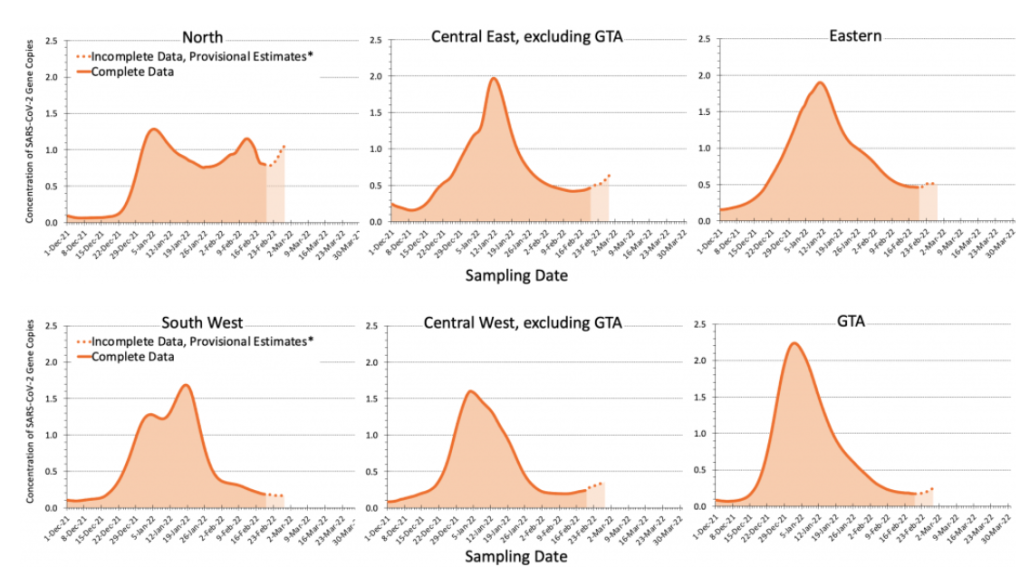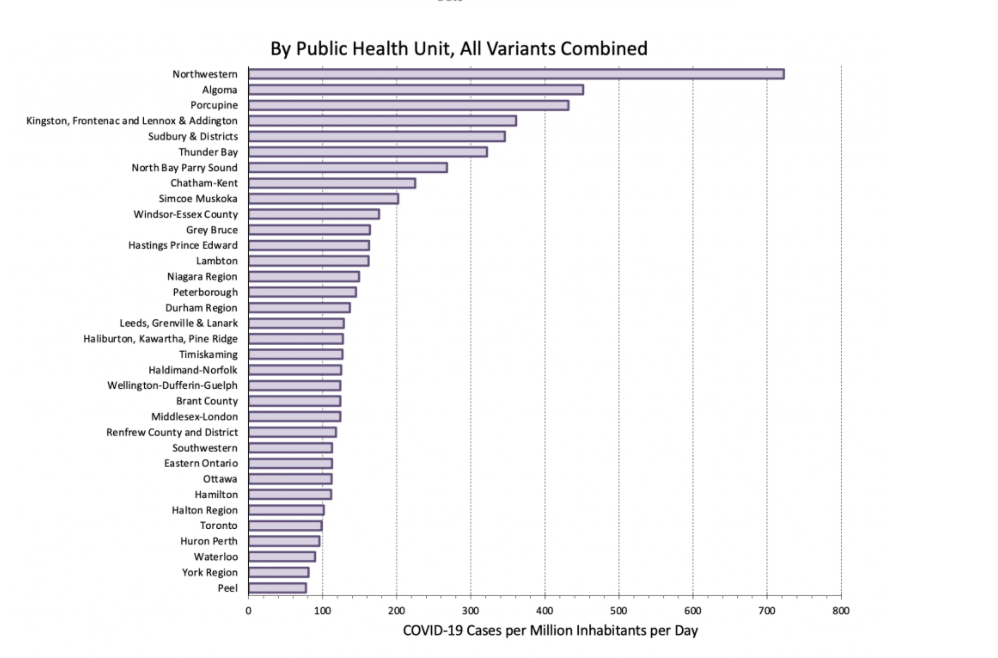Breaking down where Ontario's COVID-19 cases are located
As the province lifts vaccination requirements for businesses and prepares to drop the mask mandate by the end of the month, some regions in Ontario are still struggling with an influx of COVID-19 infections.
While hospitalizations related to COVID-19 have declined rather drastically over the last few months, the number of infections being counted by health officials has remained relatively stagnant, despite the fact that PCR testing is not available for the majority of residents.
As of Thursday, the seven-day average of daily lab-confirmed COVID-19 cases in Ontario stood at about 1,925.
The number of people actually infected with COVID-19 is much higher, with Ontario’s Chief Medical Officer of Health estimating Thursday that about 20,000 people are likely infected with the virus.
While the province’s epidemiology report shows most of the infections in the Greater Toronto Area, wastewater data paints a different picture.
According to Ontario’s COVID-19 Science Advisory Table, by mid-February there was a higher concentration of COVID-19 in northern Ontario than anywhere else in the province.
The data, which is complete until about Feb. 16, shows that the concentration of COVID-19 in northern Ontario has remained relatively stable, dipping only slightly last month and predicted to rise once again in March.
In the Greater Toronto Area, the concentration of COVID-19 in wastewater has dropped dramatically, from a concentration of over two per cent to under 0.5 per cent.
Most other regions in Ontario have experienced a relatively stable decline since January.
 Wasterwater data as presented by Ontario's COVID-19 Science Advisory Table as of March 3, 2022.
Wasterwater data as presented by Ontario's COVID-19 Science Advisory Table as of March 3, 2022.
In this case, northern Ontario encompasses the regions of Algoma, North Bay Parry Sound, Northwestern, Porcupine, Sudbury and its districts, Thunder Bay and Timiskaming.
The science table also breaks down daily COVID-19 cases per million inhabitants. Northwestern leads the way with more than 700 infections, followed by Algoma and Porcupine.
The Greater Toronto Area is at the bottom of the list with fewer than 100 infections per million inhabitants.
 Data presented by Ontario's COVID-19 Science Table showing COVID-19 cases per day, per one million inhabitants, as of March 3, 2022.
Data presented by Ontario's COVID-19 Science Table showing COVID-19 cases per day, per one million inhabitants, as of March 3, 2022.
While most of the province has followed the Ontario government’s lead and lifted the majority of COVID-19 restrictions, northwestern’s public health unit has decided to keep some capacity limits in place “due to the region’s continued high COVID-19 and hospitalization rates.”
“We are not in the same situation as most of the province. Our region continues to have the highest case rate per 100,000 in Ontario (398.1 per 100,000), and we are seeing an increase in hospitalizations for COVID-19 in our area,” the region’s medical officer of health, Dr. Young Hoon, said on Wednesday.
“Until we see a decreasing trend in local case and hospitalization data, these enhanced prevention measures can help protect our most vulnerable residents and our health care system. We will continue to monitor data and once again revisit the recommendations in a few week’s time.”
Speaking on CP24 Friday morning, Infectious Disease Specialist Isaac Bogoch said that it will be important to evaluate public health trends throughout the month of March prior to lifting further mandates.
“There certainly will be a time where mask mandates can and should be lifted and where people can wear masks voluntarily. You know, the time isn’t right now,” he said. “I would keep them on for now, I would, there’s still a lot of COVID-19.”
“The northern part of the province is actually having much more significant rates of COVID than southern Ontario …regardless at a provincial level cases are really truly coming down dramatically, hospitalizations are lower, ICU are decompressed, like we are in a much better place for sure. We can lift this, it’s just a bit too early right now.”
Here are the regions reporting the highest number of lab-confirmed positive PCR COVID-19 tests on Friday:
- North West: 117
- North East: 212
- Central East: 316
- South West: 273
- Central West: 319
Here are the public health units reporting more than 100 lab-confirmed infections on Friday:
- Toronto: 316
- Simcoe-Muskoka: 198
- Ottawa: 145
- Peel Region: 115
- Windsor-Essex: 113
CTVNews.ca Top Stories

Bird flu, measles top 2025 concerns for Canada's chief public health officer
As we enter 2025, Dr. Theresa Tam has her eye on H5N1 bird flu, an emerging virus that had its first human case in Canada this year.
Christmas shooting at Phoenix airport leaves 3 people wounded
Police are investigating a Christmas shooting at Sky Harbor Airport in Phoenix that left three people injured by gunfire.
Your kid is spending too much time on their phone. Here's what to do about it
Wondering what your teen is up to when you're not around? They are likely on YouTube, TikTok, Instagram or Snapchat, according to a new report.
6,000 inmates stage Christmas Day escape from high-security Mozambique prison
At least 6,000 inmates escaped from a high-security prison in Mozambique's capital on Christmas Day after a rebellion, the country's police chief said, as widespread post-election riots and violence continue to engulf the country.
Azerbaijan observes day of mourning for air crash victims as speculation mount about its cause
Azerbaijan on Thursday observed a nationwide day of mourning for the victims of the plane crash that killed 38 people and left all 29 survivors injured as speculation mounted about a possible cause of the disaster, with some experts saying that the airliner was damaged by Russian air defence fire.
Plush toys recalled due to choking hazard
Health Canada announced a recall on a series of plush toys due to a choking hazard. Anyone who has purchased an elephant, giraffe, lion, tiger and/or panda plush toy with an attached baby can return them to the place of purchase for a refund.
Donald Trump says he urged Wayne Gretzky to run for prime minister in Christmas visit
U.S. president-elect Donald Trump says he told Canadian hockey legend Wayne Gretzky he should run for prime minister during a Christmas visit but adds that the athlete declined interest in politics.
Prayers and tears mark 20 years since the Indian Ocean tsunami that killed some 230,000 people
People gathered in prayer and visited mass graves in Indonesia’s Aceh province on Thursday to mark 20 years since the massive Indian Ocean tsunami hit the region in one of modern history’s worst natural disasters.
New York taxi driver hits 6 pedestrians, 3 taken to hospital, police say
A taxicab hit six pedestrians in midtown Manhattan on Wednesday, police said, with three people — including a 9-year-old boy — transported to hospitals for their injuries.

































